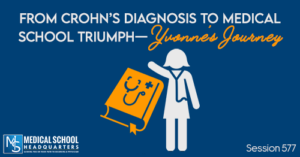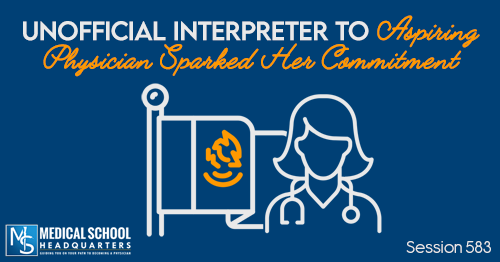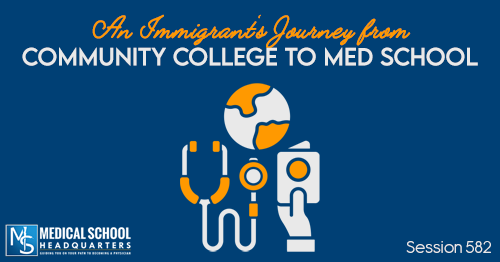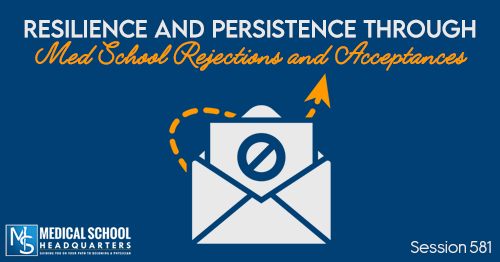
Session 577
Diagnosed with Crohn’s disease in high school, Yvonne discovered her interest in medicine through her medical experiences. Initially struggling academically, she improved her grades and applied to 48 medical schools. Hear her story today!
For more podcast resources to help you with your medical school journey and beyond, check out Meded Media.
Listen to this podcast episode with the player above, or keep reading for the highlights and takeaway points.
Realization and Early Exposure to Healthcare
Yvonne’s interest in becoming a doctor began after she was diagnosed with Crohn’s disease during her sophomore year of high school. This was her first real exposure to the medical field, as she did not have any prior family involvement in healthcare.
Yvonne recalls that there was no specific “lightbulb moment” where she decided she wanted to pursue medicine. Rather, her curiosity and interest grew the more she experienced the medical system as a patient.
“When I was a sophomore in high school, I was diagnosed with Crohn’s disease – that was the first exposure I had to the medical field.”
One particular experience that stood out to her was her first CT scan, which she found fascinating. Yvonne was intrigued by the procedures and technology involved, which sparked her interest in the medical field.
Yvonne’s initial exposure to healthcare through her own patient experience was the starting point that led her to realize she wanted to pursue a career as a doctor.
Transition to Pursuing a Career in Medicine
Prior to her Crohn’s disease diagnosis, Yvonne struggled academically in high school, finishing her freshman year with a disappointing 2.7 GPA. At that time, she lacked a clear direction or focus for her future. However, her diagnosis served as a pivotal moment that sparked Yvonne’s interest in the medical field.
“I finished my freshman year with a 2.7 GPA… after my diagnosis, it was like… if I want to go to medical school I need to get my stuff together.”
The Inspiration Behind Her Motivation
Yvonne experienced firsthand what it was like to be a patient navigating the healthcare system. This motivated her to make the conscious decision to refocus her efforts and improve her academic performance. She was determined to pursue a career in medicine, recognizing that she would need strong grades to achieve that goal.
Navigating the College Transition
For her college education, Yvonne initially enrolled at a private school close to her hometown. However, she later decided to transfer to a state university in Nebraska. Looking back, Yvonne wishes she had put more thought and effort into the college application process. She feels she could have explored more options and potentially benefited from the resources and guidance provided by a pre-health office. Yvonne’s transition to pursuing a career in medicine was not without its challenges, as she had to overcome her previous academic struggles and find the right path forward.
A Transformative Experience
Despite the initial setbacks, Yvonne’s Crohn’s disease diagnosis served as a transformative experience that redirected her focus and ambition.
Yvonne went from being an unfocused student in high school to a determined premed candidate. She was driven to excel academically and lay the foundation for a future in healthcare. This transition, while not without its hurdles, ultimately set Yvonne on the path towards her goal of becoming a physician.
Overcoming Imposter Syndrome
Yvonne experienced severe imposter syndrome throughout her premed journey. She felt like she was not smart enough to pursue a career in medicine, constantly doubting her abilities.
Yvonne recalled labeling herself as “the dumb kid” and believing that everyone around her thought her desire to become a doctor was a “giant joke.” This deep-seated self-doubt and lack of confidence in her own capabilities was a significant obstacle that Yvonne had to overcome.
“Going into college, I had a raging sense of imposter syndrome, that I’m going to fail, because I always just kind of labeled myself as just this dumb kid.”
To combat her self-doubt, Yvonne put in an extraordinary amount of effort during her freshman year of college. She would spend up to seven hours a day studying at the library, even when she didn’t have exams.
Yvonne was driven by a fear of failure, determined to prove to herself and others that she was capable of succeeding in a premed program. This intense focus and dedication was Yvonne’s way of overcompensating for her perceived academic shortcomings.
How She Addressed Her Academic Challenges
While Yvonne’s approach was somewhat extreme, it did help her build effective study habits and strategies that served her well later on. The intense focus and dedication she displayed during her freshman year allowed her to maintain strong academic performance, despite the initial imposter syndrome she grappled with.
By pushing herself to the limit, Yvonne was able to develop the necessary skills and discipline to thrive in a rigorous premed curriculum.
Balancing Coursework and Clinical Experience
In addition to the academic challenges, Yvonne found it difficult to juggle the various responsibilities of being a premed student. She had to balance excelling in her coursework, gaining clinical experience, and completing other extracurricular activities required for medical school applications.
Navigating these competing demands was a constant struggle. Yvonne had to prioritize her time and energy to ensure she was meeting all the requirements. Yvonne’s determination and willingness to put in the hard work ultimately paid off, as she successfully navigated the premed journey. Her ability to push through the challenges and maintain her focus on her goal of becoming a physician was a testament to her resilience and drive.
The Importance of Gathering Information and Building Connections
Relying on Social Media and Podcasts
Yvonne relied heavily on social media and podcasts to gather information about the pre-medical process. This included learning about the necessary prerequisites, the MCAT, and the importance of gaining clinical experience. She found these online resources to be very helpful, as she did not have any family members with prior experience in healthcare.
Seeking Advice from Connections
In addition to online resources, Yvonne also sought advice and guidance from family friends and her own doctors. She recognized that as a first-generation pre-med student, she didn’t have the same built-in connections that some of her peers may have had. So Yvonne proactively reached out to her doctors and asked to shadow them, which provided valuable clinical exposure.
Overcoming Hesitation to Ask
Yvonne initially felt awkward about asking her own doctors for shadowing opportunities, as she wasn’t sure if it was allowed or appropriate. However, she found that the doctors were actually very open and willing to teach and mentor her. This experience taught Yvonne the importance of not being afraid to ask for these types of opportunities, as healthcare professionals are often eager to support aspiring medical students.
Building a Support Network
By tapping into both online resources and personal connections, Yvonne was able to gather the information and experiences she needed to navigate the pre-medical path. This allowed her to build a strong support network and gain a better understanding of the steps required to become a competitive medical school applicant, despite not having that background within her immediate family.
The Decision to Take a Gap Year
Yvonne initially did not want to take a gap year, as she was determined to go straight through to medical school. However, after taking the MCAT, she realized her score was not as competitive as she had hoped. Yvonne had set a personal target of a 510 or higher, but her score came back lower than that. And so, she knew she needed to take the time to retake the exam and improve her application.
“I wanted to make sure that I could at least do the best that I could on that test before applying.”
The decision to take a gap year was not an easy one for Yvonne, as she had everything planned out to apply directly after college. However, she recognized that this extra time would allow her to bridge any gaps in her application and ensure she was putting her best foot forward. Yvonne was initially concerned about the financial and mental costs of delaying her medical school plans, but she ultimately decided that taking the gap year was the right choice.
Amazing Clinical Experiences During Her Gap Year
During her gap year, Yvonne decided to make the spontaneous decision to move to California and spend the year with her younger sister, who was attending college at UCSD. This was a significant change from her original plans. But Yvonne saw it as an opportunity to try something new and step outside her comfort zone.
In addition to the change of scenery, Yvonne also took on a job as a behavior therapist, working with children who have autism. This gave her a unique clinical experience, different from the more traditional medical shadowing or scribing roles. Yvonne found this work to be incredibly rewarding and valuable, as it allowed her to gain exposure to a neurodivergent population.
Yvonne also volunteered at a colorectal surgery clinic during her gap year, which was directly relevant to her medical interests. This combination of work and volunteer experiences helped Yvonne build a well-rounded application and gain a deeper understanding of the healthcare field.
“If you are taking a gap year and you weren’t planning on it, go branch out – and go do something that you otherwise would never have time to do.”
Overall, Yvonne’s gap year was a transformative experience. It allowed her to step back, reevaluate her plans, and ultimately strengthen her application – in ways she may not have been able to do if she had gone straight through to medical school.
Application Process and Reflections
When it came to Yvonne’s medical school application process, she took a very comprehensive approach, applying to 48 schools. She felt that this was an “overboard” number, but Yvonne was determined to give herself the best possible chance of getting accepted, as she only wanted to go through the application process once.
Yvonne reflects that her application was quite traditional – she took all the required prerequisites, had four years of undergraduate experience, and then applied after a one-year gap. She didn’t have any “drastically crazy” experiences or achievements that would make her stand out.
Initially, Yvonne was very focused on trying to make herself seem unique and different in her application. She watched a lot of Application Renovation videos and felt pressure to find ways to make herself stand out. However, after listening to advice from others, Yvonne realized that the best approach was to simply be authentic. She learned that she just had to highlight her genuine experiences and what she had learned from them.
“I just took a step back… I just need to be myself. I’ve done a lot of things that are not anything super spectacular, but I did them, and I’m going to write about them and what I learned from them.”
Getting One Interview and One Acceptance
One area of Yvonne’s application that she believes may have impacted her success was her MCAT score. While her overall score of 512 was solid, she struggled with the CARS (Critical Analysis and Reasoning Skills) section, scoring a 122. Yvonne suspects this lower CARS score may have led some schools to filter her out initially, even though her other section scores were in the 130s.
Despite the challenges, Yvonne’s application process ultimately resulted in her receiving one interview invitation and one acceptance. She reflects that this was a validating experience, especially after the hard work and self-doubt she had navigated throughout her premed journey.
Receiving the Acceptance and Future Plans
When Yvonne received the acceptance notification, it was on the very first day that decisions were being released. She had been expecting to have to wait until at least December, so getting the news in the early morning of the first decision day was a pleasant surprise.
Yvonne was excited, but initially kept the news to herself, waiting a few days before sharing it with her parents in person.
Yvonne’s parents were very supportive and excited about her acceptance, even though they had confidence in her ability to get in all along. For Yvonne, being able to share this accomplishment with her family in person was an important moment.
Looking Forward to Medical School
As Yvonne looks ahead to starting medical school, she is primarily excited to return to a more structured academic environment. She has missed the routine of classes, exams, and the overall learning experience that comes with being a student.
At the same time, Yvonne expresses some nervousness about the intensity of medical school. She has heard many “horror stories” about the workload and challenges that come with the program. Additionally, her own imposter syndrome makes her question whether she will be able to handle it academically.
In terms of potential specialties, Yvonne is considering areas related to pediatrics or neurology. Her experiences working with children during her gap year, as well as her personal connection to the medical field through her Crohn’s disease, have influenced her interests. However, Yvonne remains open-minded and plans to explore different options once she starts medical school.
Final Words of Wisdom
Yvonne reflects that everything seemed so much bigger and more difficult when she was in the midst of her premed journey. She would get extremely upset over setbacks, like failing a chemistry exam, and would isolate herself for days, crying over it. However, looking back, Yvonne realizes these challenges, even the bigger ones like the MCAT and medical school applications, were not as serious as they felt at the moment.
“Everything seems so much bigger when you’re in it, but then looking back, it’s literally nothing… Just do your best and it will work itself out.”
Yvonne says that if she could go back, she would tell herself to just relax and do her best, because things have a way of working themselves out. She has learned that the stress and anxiety she experienced were often disproportionate to the actual gravity of the situation.











